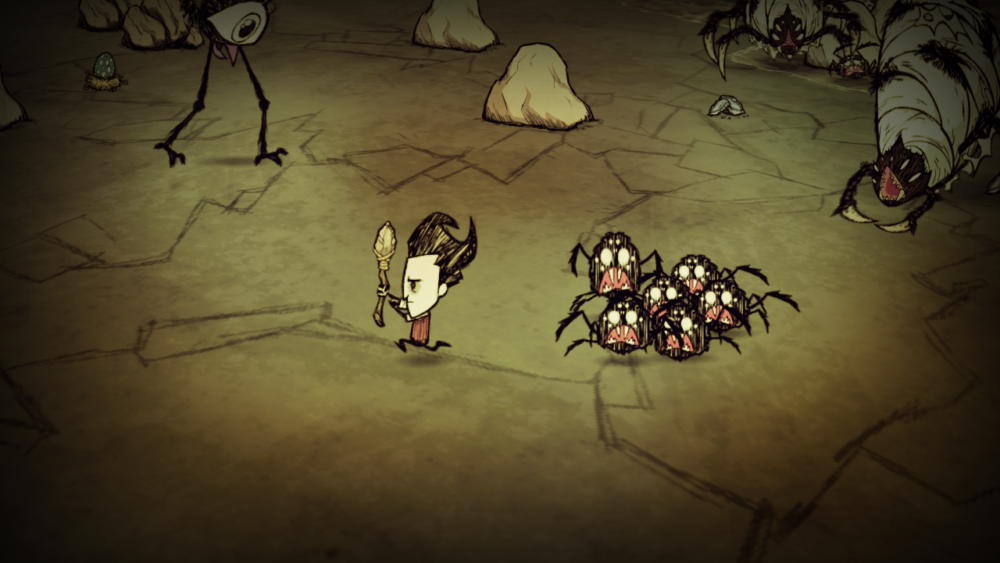Less power for the players can make games better
One of our speakers at the Intel® Buzz Workshop Berlin is Valentina Tamer, a game designer, writer and artist working for game developer Daedalic Entertainment. Her talk approaches Disempowerment Fantasies – a concept we frequently encounter in video games, but rarely even notice. Our Social Media Manager Sandy talked with Valentina Tamer about why turning players into almighty gods isn’t necessarily a powerful game design decision.
 Disempowerment in Don’t Starve: When it gets dark you better be prepared (img source: Klei Entertainment)
Disempowerment in Don’t Starve: When it gets dark you better be prepared (img source: Klei Entertainment)

Valentina Tamer
Valentina, can you describe what your talk is about?
My talk is about disempowerment in video games. So to say: If the game designer takes power away from the player. Video games are often considered as power fantasies and they are often designed as a power fantasy.
But having more power in video games, isn’t that the intriguing thing about them?
My thesis is that it limits the potential of video games. There are a couple of modern games in the last, let’s say ten years, that have actually played with taking power away from the player in order to create richer experiences. In my talk I’m going to look at how you would define and create a feeling of powerlessness or the loss of power in a player; what you can do with that, what kind of situations you can create that way and then I’ll talk about different sciences to make sense of how disempowerment works in video games. For example: Media theories, sports psychology, learning psychology and game theory. I’m going to set up some theses why a player would even want to feel disempowered in a video game.
There is the danger that if you disempower the player too much they are going to be frustrated
Would you say that you prefer games with a design based on disempowerment?
Not necessarily. The thing is: You don’t need to base your game on either power or disempowerment. In fact, games that are designed to be power fantasies can also become better if you include disempowerment at specific points. So I wouldn’t say that you have to do either-or, but I enjoy games that use disempowerment in interesting ways, also in emotional ways. But it’s also a matter of mood. Sometimes I like games that are power fantasies, but there is a tendency that games that play more with disempowerment will draw my interest, because they might be something new and interesting to see.
Could you name examples of games with disempowerment?
Amnesia the Dark Descent was very interesting and the ways it used disempowerment. Then Undertale had very interesting elements in there and there is a really obscure game, called “Mondo Medicals”. It’s kind of a spacial puzzle game, a first-person puzzle game where you get instructions on what you have to do, like ‘follow the arrows’ to get to the goal, but the instructions are lying to you. It’s very creepy, oppressive and intimidating. Don’t Starve – basically all survival games are playing with lots of disempowerment.
 Waking up in a nightmare – Amnesia the Dark Descent is a classic example for disempowerment in games (img source: Frictional Games)
Waking up in a nightmare – Amnesia the Dark Descent is a classic example for disempowerment in games (img source: Frictional Games)
What was your greatest moment in a video game with disempowerment?
I remember a couple. For example, when it gets dark in Don’t Starve, the shadows come out and if you don’t have lights to keep them at bay, you’re going to die. The first time I played it, nobody explained that mechanic to me ahead of time so I was just trying it out on my own and it got darker. I didn’t know what to do, it was a really close call and I felt helpless, like: ‘What am I supposed to do? There are shadows and the music is creepy, my character seems to panic, what am I supposed to do?’ And I think the first time I just died, but it was a powerful experience and it was all the nicer when I then realised what I must do in the second round. That was powerful.
But situations like these can also be frustrating for players. What do you have to pay attention to while designing games with disempowerment?
There is the danger that if you disempower the player too much they are going to be frustrated, won’t enjoy the game and just put it away. But this is, first, a matter of target audience: How much frustration do they expect in this game and how much frustration do they want? There are hardcore games like Dark Souls that are infamous for being hard, but people choose these games and expect a hard and really frustrating game. But if you release a mobile game that has cute graphics, looks like it’s easy to play and then is frustrating or the progression of how frustrating it is isn’t very balanced, then you get a problem.
Could you elaborate on that?
It’s basically all about defining your target audience, defining your advertisement: How do you want to present the game? How do you form the people’s expectations? But expectations are also formed within the game. You must stay within the expectations or if you go outside of them – make it in a clever way. It’s a matter of testing whether it works or not. The amount of frustration has to be adjusted to the kind of game you’re making, what situation the player is in at that moment and how frustration progresses, because the level of challenge in a game is rarely always the same. It has to fluctuate to create a pleasurable experience. Playtesting is a thing you have to do as well, it’s about fine tuning. You can effectively plan everything ahead. You have to be aware of the problem and test it and always remember who you’re making this game for.
 Dark Souls is infamous for being hard, but players choose it for this reason (img source: FromSoftware)
Dark Souls is infamous for being hard, but players choose it for this reason (img source: FromSoftware)
Beyond casual and hardcore gamers, is there a more specifically defined target group for this kind of games?
No, actually not – because disempowerment mechanisms belong to every game genre. Horror games, survival games and narrative games are especially big on disempowerment, so people that like these kinds of games would be the target group. Also, people who are interested in Indie Games that experiment with new kinds of gameplay. Edutainment can also benefit from using disempowerment.
What makes games with disempowerment mechanisms appealing for players?
There are lots of different reasons. There are nine different reasons, which I will name in my talk. But as a summary one could say that it is attractive to players, because it enrichens the game experience and makes it more rewarding. It puts you deeper into the moment and it gives you the opportunity to handle subjects in a manner that pure power fantasies cannot cover.
Need more input? You can buy Valentina’s eBook “Directing Games: Fantasies of Disempowerment” on Amazon or directly meet her at the at the Intel® Buzz Workshop Berlin, the free one day conference focusing on tech and content trends in the games industry. See you there!


